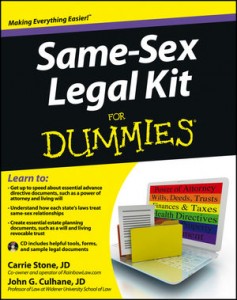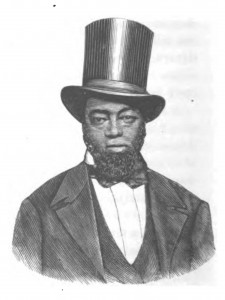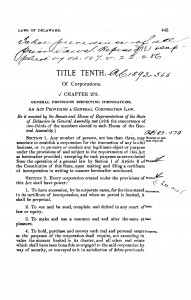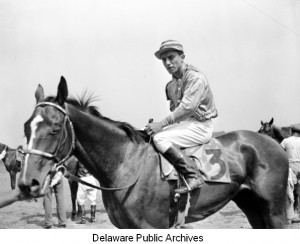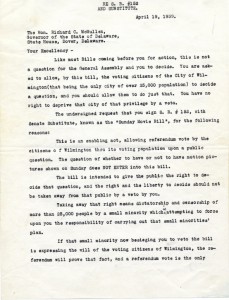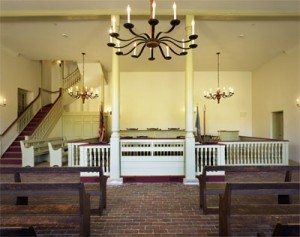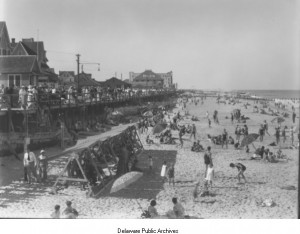
Rehoboth Beach boardwalk 1931. Someone might be disrobing behind a beach chair.
This is going to be my last post on weird laws of Delaware. I hope you’ve enjoyed reading them as much as I enjoyed researching them. Today I’m going to look at a number of weird laws on disparate subjects that all have one thing in common. See if you can figure out what it is.
In Rehoboth Beach, Delaware:
No person shall change clothes in his or her vehicle.
status: mostly true [It’s only illegal if your car is in a public place. Feel free to change in your garage.]
§ 198-14. Disrobing in public. No person shall disrobe under the boardwalk, on the beach or in any vehicle while such vehicle is parked upon any public street or way or other public place in plain view of the public.
One may not whisper in church.
status: mostly true [It’s only illegal if you are disrupting or disturbing the congregation. If the congregation wants to have an all whispered service they can go ahead.]
§ 198-23. Disturbing religious worship and lawful assemblies. A. No person shall disrupt or disturb any congregation or assembly met for religious worship by noise, talking or whispering, or by rude or indecent behavior, or by profane language within their place of worship, or within 300 feet of the place of worship.
No person shall pretend to sleep on a bench on the boardwalk.
status: true [This is a perfectly normal law for a beach town, except for the “pretending” to sleep clause. I guess the local judges got tired of people using the “I wasn’t really asleep” defense.]
§ 198-30. Sleeping on boardwalk. No person shall sleep, lie or occupy as a sleeping quarter, or under the guise of pretending to sleep on the boardwalk, any bench located on the boardwalk in any pavilion located at the end of any street or on any bench located on any street.
Changing into or out of a bathing suit in a public restroom is prohibited.
status: true
§ 198-15. Changing clothes in comfort station prohibited. No person shall change his clothing from bathing suit to street clothes or otherwise within the comfort stations maintained by the City.
Six-year-old girls may not run around without being fully clothed.
status: true [But this is a deliberately obtuse reading of the law. Obviously 60 year old women are equally prohibited from topless bathing.]
§ 198-13. Topless bathing suits prohibited. No female over the age of five years shall wear a topless bathing suit or otherwise fail to cover her breasts with less than a full opaque covering of any portion thereof below the upper portion of the nipple.
Alcohol may not be served in nightclubs if dancing is occurring on the premises at the same time.
status: true [Actually nightclubs that allow dancing may not serve alcohol at all, no matter when the dancing is occurring.]
§ 134-13. Alcoholic beverages prohibited. No person shall sell, give, dispense, provide or keep or cause to be sold, given, dispensed, provided or kept any alcoholic beverage on the premises of any dance hall establishment.
In Lewes, Delaware:
It is illegal to wear pants that are “firm fitting” around the waist
status: not true [This is one of the most commonly cited weird Delaware laws on the internet. It is definitely not in the current Lewes code of ordinances. It is possible it used to be a law but I can’t check because we don’t have older city ordinance for Lewes in our library.]
Did you figure out what they all have in common? They are all local laws, municipal ordinances that have been passed by a town or city in Delaware. Many of the laws cited on weird laws websites are often local laws. Laws passed to deal with local problems do often seem strange when taken out of their local context. For instance, many of the laws from Rehoboth Beach were probably passed to deal with the problems of a beach town, by trying to discourage nightclubs, stop day trippers from changing out of their bathing suits on residential streets, and keep drunk college students from sleeping on the boardwalk. Many beach towns have similar laws.
Legal research classes don’t spend much, if any time teaching how to research local laws, but these laws can greatly affect your clients’ everyday lives, so it’s worthwhile taking the time to learn how to find them. The internet has made researching local laws easier than it used to be. Many cities and towns have their municipal codes available on their website. There are also two companies that specialize in creating municipal codes, Municipal Code Company and General Code and many local codes can be found free on their websites. For more information on researching local laws, I’d recommend reading this excellent article by Mary Whisner of the University of Washington.
Photo credit: Delaware Public Archives. Board of Agriculture Glass Negative Collection.
http://cdm15323.contentdm.oclc.org/u?/p15323coll6,6621
For more information on local laws see: Mary Whisner. Enact Locally. 102 Law Library Journal 497 (2010)
![]() The Sunlight Foundation has created Open States, a website that tracks legislative information for all 50 states. This information has been available from state websites but it isn’t always easy to use. Open States gathers all the information with one easy to use interface. You can track bills, check your legislator’s voting record, even click on a map to find out who your state legislators are. Having just tried to do the same thing on the state of Delaware’s voting district maps, Open States definitely has an easier map interface.
The Sunlight Foundation has created Open States, a website that tracks legislative information for all 50 states. This information has been available from state websites but it isn’t always easy to use. Open States gathers all the information with one easy to use interface. You can track bills, check your legislator’s voting record, even click on a map to find out who your state legislators are. Having just tried to do the same thing on the state of Delaware’s voting district maps, Open States definitely has an easier map interface.


